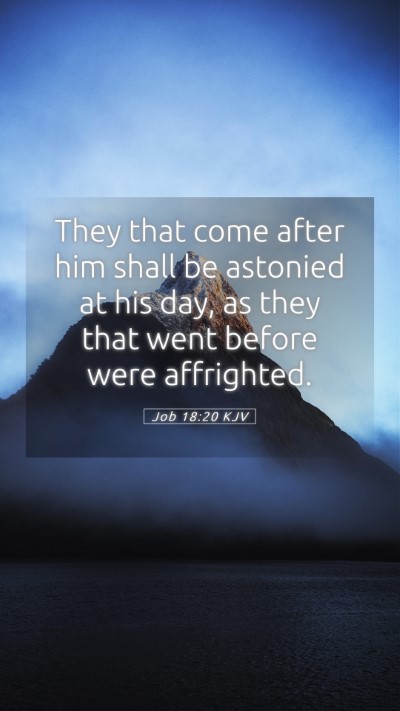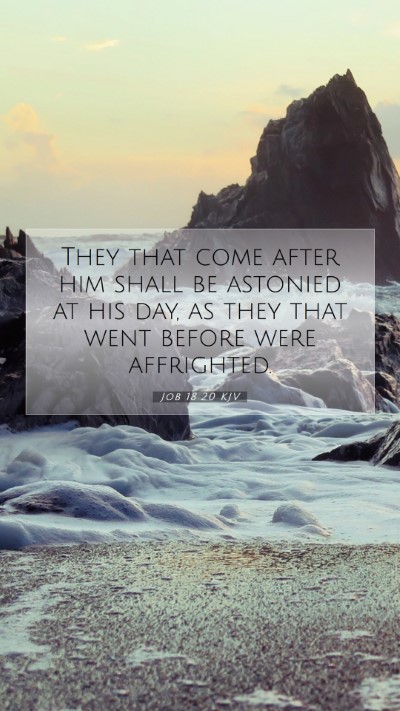Old Testament
Genesis Exodus Leviticus Numbers Deuteronomy Joshua Judges Ruth 1 Samuel 2 Samuel 1 Kings 2 Kings 1 Chronicles 2 Chronicles Ezra Nehemiah Esther Job Psalms Proverbs Ecclesiastes Song of Solomon Isaiah Jeremiah Lamentations Ezekiel Daniel Hosea Joel Amos Obadiah Jonah Micah Nahum Habakkuk Zephaniah Haggai Zechariah MalachiJob 18:20 Meaning
What is the meaning of Job 18:20?
They that come after him shall be astonied at his day, as they that went before were affrighted.
Job 18:20 Bible Verse Meaning
Understanding Job 18:20
Verse: Job 18:20 — "They of the west are astonished at his day, and horror taketh hold on the inhabitants of the isles." This verse, situated in the context of Job's discourse, reflects the broader themes of judgment, despair, and the consequences of wickedness. To understand this verse, let us delve into various public domain commentaries for a comprehensive interpretation.
Bible Verse Meanings
Job 18:20 encapsulates a profound sense of horror and astonishment regarding the fate of the wicked. This echo of fear resonates not only in the immediate vicinity of Job but also is seen to extend to distant lands, as represented by "the west" and "the isles." Here are some insights drawn from notable commentaries:
-
Matthew Henry Commentary:
Henry explains that this verse illustrates the universal response of fear towards the divine judgment that befalls the wicked. Job emphasizes that the consequences of a sinful life are well-known and evoke trepidation in far-off lands. He highlights the certainty of God's judgment, making it evident that even those who are geographically distant are not exempt from the dread associated with divine retribution.
-
Albert Barnes' Notes:
Barnes reflects on the societal implications of wickedness as he interprets the verse. He notes that the horror of judgment extends beyond personal experience and becomes a communal affair. Individuals in "the west" and "the isles" may either witness the downfall of the wicked or speculate about it, indicating a social conscience that is deeply affected by moral failure. This connectivity across regions speaks to humanity's collective grappling with injustice.
-
Adam Clarke's Commentary:
Clarke adds to the discourse by elucidating the metaphor of geographic extremes to represent the far-reaching impact of divine judgment. He indicates that the verse serves as a warning to those who might take comfort in their distance from the suffering of the wicked, asserting that all should soberly consider the implications of their own actions before the omnipresent judgment of God.
Bible Verse Interpretations
As we interpret Job 18:20, it becomes crucial to appreciate the plight of Job's condition amid the dialogues with his friends. This verse serves as a snapshot of his existential crisis while simultaneously calling attention to a greater divine narrative. Commentary insights provide a framework for interpreting the broader themes present in this passage:
-
Universal Judgment:
The common theme articulated is that divine judgment knows no boundaries. The fear expressed by the inhabitants of distant lands is a testament to the reality that sin and its consequences are universally recognized phenomena.
-
Suffering and Solidarity:
Job's suffering elicits similar sentiments in those far away, suggesting an inherent solidarity in human suffering and the moral responsibilities that are shared globally.
Biblical Exegesis
This verse is pivotal in understanding Job’s overall narrative. It exemplifies the philosophical and theological exploration of suffering. Here are key points for deeper exegesis:
-
Contextual Analysis:
Understanding the circumstances under which Job speaks provides clarity. He addresses the outcomes of wickedness as a stark contrast to righteousness, a recurring theme throughout the book.
-
The Role of Fear:
Fear is not merely an emotion but a significant response to divine justice, prompting reflection on one’s moral choices. The acknowledgment of horror reflects an inherent understanding of cosmic order and accountability.
Bible Study Insights
Studying Job 18:20 offers essential insights for Bible study groups and individuals alike. This verse serves as a pivotal discussion point on the nature of suffering and divine justice:
- Examining the emotions of those who witness injustice and suffering can foster deeper discussions on empathy and morality.
- Consider how historical and geographical context impacts the interpretation of divine judgment. Group discussions can draw parallels to contemporary situations.
Additional Bible Cross References
To enrich the study of Job 18:20, consider exploring the following cross-references:
- Job 4:8: This verse emphasizes the retributive nature of God’s justice, supporting Job's claims about the fates of the wicked.
- Job 31:3: Job contemplates the consequences of sin, aligning with the themes of judgment found in chapter 18.
- Psalms 37:38: This Psalm addresses the ultimate end of the wicked, resonating with the fears expressed in Job’s lament.
- Proverbs 11:21: This verse reiterates the assurance that justice will be served, reinforcing the themes present in Job’s declaration.
- Isaiah 33:14: Discusses the fear of the wicked in the presence of divine judgment, paralleling Job’s sentiments.
Conclusion
Job 18:20 serves as a thought-provoking verse that evokes a myriad of interpretations concerning divine justice and human empathy in the face of suffering. Combining insights from Matthew Henry, Albert Barnes, and Adam Clarke highlights the verse's significance in discussing moral principles and the nature of fear related to divine retribution. This comprehensive understanding encourages readers to reflect deeply on the implications of their actions and beliefs, fostering a rich ground for ongoing Bible study and discussions.


